| Srl | Item |
| 1 |
ID:
161392


|
|
|
|
|
| Summary/Abstract |
Despite its importance in modern daily life, the history of the advertising industry in Israel has elicited little scholarly interest. This article seeks to fill this lacuna by offering the first comprehensive survey of Israel’s advertising industry from its early beginning in 1863 to the present day, while identifying four distinct phases in this process (1863–1922; 1922–1960; 1960–1993; 1993 to the present). It also suggests a theoretical model of influencing factors and processes that shaped – structurally and functionally – the development of this industry.
|
|
|
|
|
|
|
|
|
|
|
|
|
|
|
|
| 2 |
ID:
161390
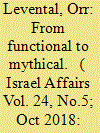

|
|
|
|
|
| Summary/Abstract |
This article seeks to analyse and portray the mythologisation of sport venues in Israel through a close examination of the particular case study of Ussishkin basketball arena in Tel Aviv. Notwithstanding the current lack of Israeli mainstream recognition of sport places as a built cultural heritage, it is argued that the Ussishkin arena demonstrates the extensive social implication carried by those seemingly functional facilities, not exclusively during their ongoing operation but as a timeless nostalgic and symbolic icon. While the mythical aura is confined to the sports fans’ view of those places, the cultural discourse is no longer conducted within the narrow boundaries of the sports media. The magnitude of the fans’ resistance in the case of Ussishkin arena assured that it would be considered in any future debate regarding the social relevance of sport facilities to the urban fabric.
|
|
|
|
|
|
|
|
|
|
|
|
|
|
|
|
| 3 |
ID:
161385
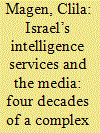

|
|
|
|
|
| Summary/Abstract |
This article provides an overview of the relationship of two Israeli intelligence services and the media over four decades. It explores how Israel’s external and internal intelligence services have dealt with the public sphere in times of publicised crises, and analyses the main differences between the internal and external intelligence services when addressing the media.
|
|
|
|
|
|
|
|
|
|
|
|
|
|
|
|
| 4 |
ID:
161382


|
|
|
|
|
| Summary/Abstract |
This article records an interview with Joel Singer, one of the authors of the Oslo Accords who was brought into the process from Washington DC at a later stage of the negotiations. The Oslo channel was established by Deputy Foreign Minister Yossi Beilin, Norwegian academic Terje Rød-Larsen and Israeli academic Yoel Hirschfeld, who understood Yasser Arafat’s need to initiate a new path for relationships with Israel. At that time, negotiations with the Palestine Liberation Organization (PLO) were illegal. The PLO was considered a terrorist organisation and the Israeli government refused to officially negotiate with Arafat, though it was clear that he was still the person most able to strike a deal, and the only true representative of the Palestinian people. Bilateral negotiations begun in Washington between Israelis and Palestinians who were supposedly independent of the PLO led to nowhere. This is Singer’s version of this peace chapter. The article assesses the positive and negative aspects, lessons and implications of the process and of the Oslo Accords.
|
|
|
|
|
|
|
|
|
|
|
|
|
|
|
|
| 5 |
ID:
161386
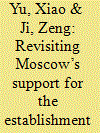

|
|
|
|
|
| Summary/Abstract |
Examination of recently declassified documents in the Russian and Israeli archives reveals that Moscow’s support for the establishment of the state of Israel was largely designed to sustain the World War II cooperation with Washington, which also supported the creation of a Jewish state. With the advent of the Cold War, the Soviets maintained their support due to the belief that the US’s immersion in the regional tensions attending Israel’s continued existence would greatly relieve its military pressure on the Soviet Union in Europe.
|
|
|
|
|
|
|
|
|
|
|
|
|
|
|
|
| 6 |
ID:
161384
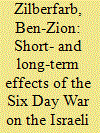

|
|
|
|
|
| Summary/Abstract |
This article examines the short- and long-term effects of the 1967 Six Day War on the Israeli economy. In the short run, the war led to a very big increase in aggregate demand (mainly military expenditures). This got the economy out of a Keynesian recession that prevailed before the war. There were several long-term effects. The French embargo on arms shipments to Israel, following the war, induced the development of a large military industrial base, which later became the basis for the impressive development of the high-tech industry. The influx of Palestinian workers into Israel depressed wages of unskilled workers, which slowed down the shift to more efficient production techniques (especially in construction). It also increased the dependency of the Palestinian economy on income earned by Palestinian workers in Israel.
|
|
|
|
|
|
|
|
|
|
|
|
|
|
|
|
| 7 |
ID:
161383
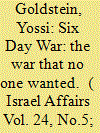

|
|
|
|
|
| Summary/Abstract |
As a military clash that it is still unclear if anyone truly wanted, the June 1967 Six Day War remains one of the most curious military conflicts in modern history. Israel certainly did not prefer the military route, and neither did Egypt, Syria, or the Soviet Union. Yet while it was clear to these parties from the outset that nothing good could come from such a clash, they backed Israel into a corner from which it was unable to extricate itself without going to war. This article explores the factors that caused the war at the time and in the manner it did.
|
|
|
|
|
|
|
|
|
|
|
|
|
|
|
|
| 8 |
ID:
161387
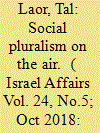

|
|
|
|
|
| Summary/Abstract |
Internet radio stations that broadcast exclusively on the Internet are a growing phenomenon in Israel, providing a stage for new and diverse voices in Israeli society. This article charts the activity of Internet radio stations in Israel and evaluates their social contributions by focusing primarily on music selection, broadcast content, and target audiences. It shows that the establishment of Internet radio stations is connected to progressive trends in Israeli society. New and varied voices, not necessarily heard before in traditional media and especially traditional radio, have been given a platform for the first time. This makes Internet radio an important expression of social pluralism in communications media, which is essential and necessary for the healthy maintenance of a democratic society with so many internal divisions.
|
|
|
|
|
|
|
|
|
|
|
|
|
|
|
|
| 9 |
ID:
161388


|
|
|
|
|
| Summary/Abstract |
This article examines a 1980s initiative of a family-owned Israeli bank in support of culture and the arts as part of its community outreach efforts. It shows that despite its strategic aims and reliance on the principles of modern marketing and public relations, the initiative combined these newer ideas of corporate philanthropy with the bank owners’ longstanding family tradition of philanthropy, charitable giving, and public engagement.
|
|
|
|
|
|
|
|
|
|
|
|
|
|
|
|
| 10 |
ID:
161389
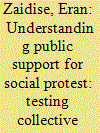

|
|
|
|
|
| Summary/Abstract |
Despite its acclaimed role in democratic theory, social protest is not a common occurrence in most states where widespread political participation is typically limited to voting, and mass participation is otherwise rare. This article examines public opinion regarding the 2011 summer protests in Israel, in which hundreds of thousands took to the streets in wide-scale events that lasted for several weeks. It does so by focusing on two independent samples, one of university undergraduate students and the other of active protesters, totaling 59 respondents. Findings suggest that support for the protest most strongly affiliated with concerns of social injustice coupled with the belief that government responsible for this state of affairs.
|
|
|
|
|
|
|
|
|
|
|
|
|
|
|
|
| 11 |
ID:
161391
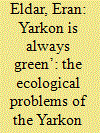

|
|
|
|
|
| Summary/Abstract |
The history of the Yarkon River in the twentieth century reveals the ecological problem of the principal perennial stream flowing almost entirely within the country. Until the 1950s, the Yarkon was a pleasant stream, but the water was insanitary for drinking or swimming. Since the construction and expansion of the Yarkon‒Negev pipeline Project, part of the National Water Plan (since 1955), the water level has gone down and pollution has increased. This article deals with the story of the contamination of the Yarkon, the reflection of this situation in the press, and the failed attempts to purify the river in the decades after the establishment of the State of Israel.
|
|
|
|
|
|
|
|
|
|
|
|
|
|
|
|